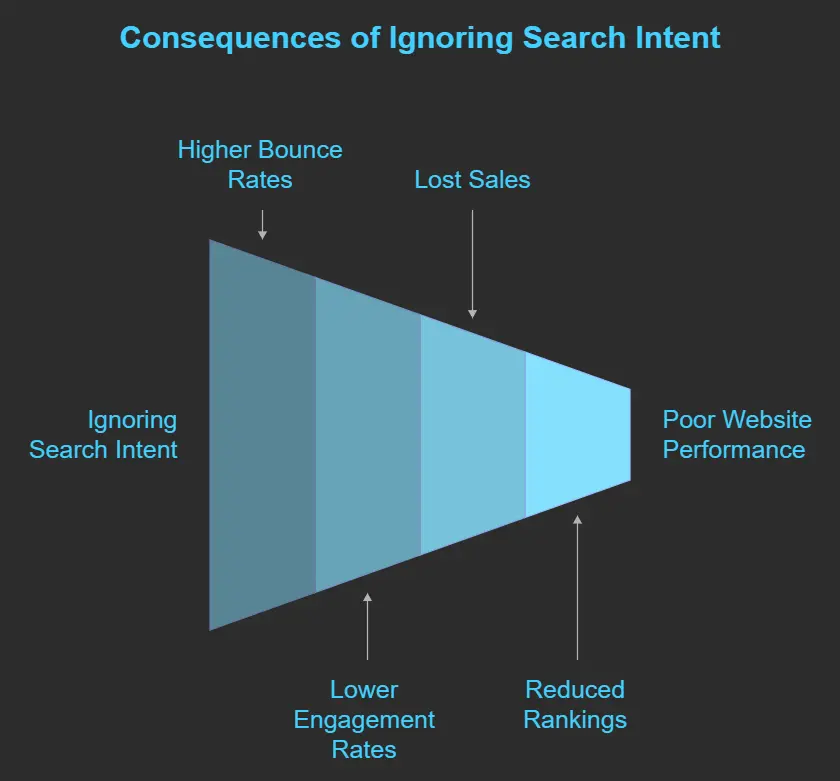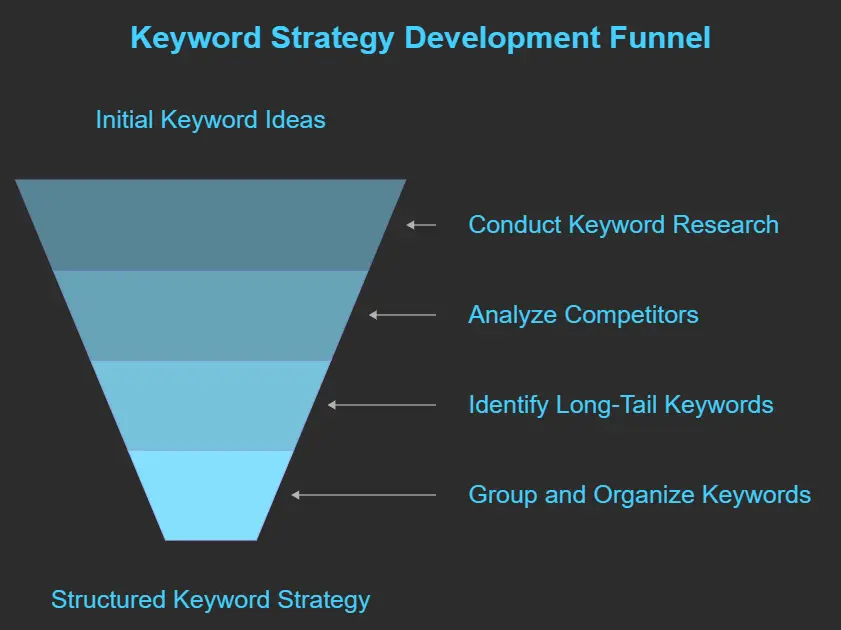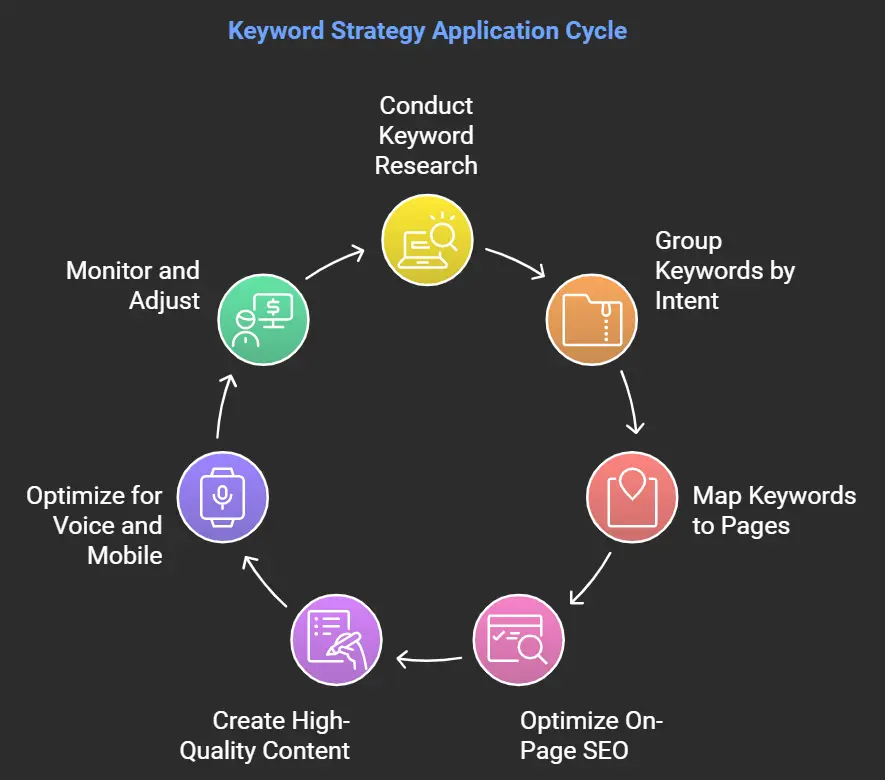How to Find Low Competition Keywords for Quick Wins

Table of the content
Introduction
The finding of low-competition keywords is an elementary requirement to fuel the right diversification strategies when striving to enhance an SEO strategy. The world of the internet in current times is highly competitive for some space, and most people hanker to be noticed on the internet. Most tend to do whatever it takes and try to keep “pushing through” the virtual world; however, one very important strategy that most forget in that process is focusing on keywords with low competition but decent traffic. As a local SEO expert and founder of Digital Deep Tech, I’m here to guide you through this process and give you actionable strategies to discover your golden keywords.
Day 14 of the Free SEO Course
Learn advanced strategies, then reach out to get online training to take your skills to the next level!
The challenge of ranking high
It keeps changing as more sites come up daily. Every business too gains an online presence so the competition is getting tougher. Thousands of businesses go frustrated and lose resources since their target keywords are pretty hard to rank for in the SERPs. You could spend much time and money and see little or nothing at all.
At one point, it might land you deep in trouble for not paying much importance to low-competition keywords. You might lose yourself in the vast digital marketing ocean of competition, which makes it extremely hard to reach the audience you’ve sought. This obviously has negative implications on online visibility, traffic, and then on sales.
Usually frustration gets a hold of people and causes them to pack it all in on SEO as if weren’t worth bothering with. And this, too, is simply wrong. You can win by bringing your focus on low-competition keywords, letting your content stay the center of attention amidst the noise.
Need to Focus on Search Intent
Low-competition keywords, understanding of search intent, coming together. This is how you should approach low-competition keywords. Search intent, in a simple word, is the underlying purpose behind the user’s query. By aligning your keywords with their intent, you will win hands down.
As you are not considering search intent, you might be creating content that never connects well with your audience. For example, you typed to the search “how to find low competition keywords”, but you just gave random general tips about SEO that contradicts the reason why he came to your page and will most likely leave soon. Such behavior may raise your bounce rate, though it can bring down your rank in the long run.

Keyword Research Importance
Another very important takeaway that I can list is the following: Keyword research is the backbone of good SEO. Advanced keyword research is finding words that your target audience would use in a search, along with how much competition there would be for those words. Many grossly underestimate this important step, creating poorly optimized content and lost opportunities.
It’s all the time you will use in researching keywords. The successful SEO campaign will be built on all this time you use. You will know which keywords to go for and how to create content for them.
High Competition Effect
Imagine going through all your weeks only to realize that the bigger competition is way ahead of you with much higher authority. The frustration becomes worse as you later come to know that it takes months or years to get ranking among high-competition keywords. You basically put all your soul into the content and fail to relate to the target audience.
With high competition comes high cost-per-click paid ads. That would mean burning all your marketing budget without winning the desired result. The second aspect is very low visibility, and that’s leaving fewer clicks, leads, and conversion. The longer this continues, the more challenging it will be for you to maintain your business.
This scares off the businesses, and they abstain from choosing SEO for their website. Remaining in that cycle brings huge loss in terms of revenue. But then, there is always an alternative. You can easily carve out niches and begin to gain traffic sooner with low-competition keywords.

The Path to Finding Low-Competition Keywords
Not all keywords are alike. Look for keywords that come with a good mix of both search volume and competition. High-competing keywords can be killers for a new site, so start from mid-level keywords and work out.
Step 1: Understanding Low-Competition Keywords
Before actually venturing into the keyword research, it is essential to know what low-competition keywords actually are.
Definition: Low-competition keywords are phrases that indeed have fewer websites to compete with them in search results. This makes ranking easier.
Examples include:
- Best local bakery in [Your City]
- Affordable vegan restaurants near me
If you focus on these kinds of keywords, there’s a chance that your rankings might be faster, and the traffic to your website will be higher.
Characteristics of Low-Competition Keywords
For such low search difficulty keywords usually have a smaller keyword difficulty score.
- More specific: They are generally more specific than general keywords and target niche audiences.
- Long-tail Nature: Most of the low-competition keywords are long-tail and can capture the highly motivated potential searchers. Knowing these aspects will help you identify some of the possible keywords for targeting.
Step 2: The Significance of Search Intent
You need to know the search intent when you use low-competition keywords. Search intent is what lies behind a user’s search query. Find keywords that match the intent of searchers: increase the chances of ranking.
Types of search intent
- Informational : Users want to get information (for example, “How to bake bread”).
- Navigational : Users are searching for a specific website (for instance, “Facebook login”).
- Transactional: The user wants to buy something, such as “Buy running shoes online”.
Thus, based on the intent of possible keywords, you can narrow down the phrases that relate to what the users are going to search for.
Search Intent Analysis in Keyword Research
Each time you conduct keyword research, ask yourself what is the intent of the user when doing their search. That’s how it makes content user-centered.
For instance, if someone is looking for “how to find low competition keywords,” most likely they want a step-by-step guide. The more you answer their needs, the more chances you have to rank well for that keyword.
Step 3: Using Keyword Research Tools
Now you will have to use keyword research tools to look for low competition keywords. Here are some tools I would recommend:
Google Keyword Planner: It is free and helps you find keywords, also giving information about the competition levels attached to them.
Ubersuggest: This tool is very friendly to use and gives ideas on keywords and their search volume and competition data.
Ahrefs: It is a full-fledged SEO tool as it also gives you keyword difficulty and search volume insights.
SEMrush: This is an extremely powerful tool that will help you discover low-competition keywords.
Using these tools, start searching for your target focus keyword “find low competition keywords”. Observe the competition level and search volume in the results.
Vital Features to Look For Keyword Tools
As you use keyword research tools, be on the lookout for features that add depth to your research processes:
Keyword Difficulty Scores
This measures the difficulty that you experience when trying to rank for a specific keyword.
- Search Volume: The frequency with which a keyword is searched, month-to-month can give you an idea of which keywords to rank for the highest.
- Trends: Knowing if the popularity of a keyword is going up or down can inform your approach.
Step 4: Analyze Competitors
Now that you have that list of keywords that may have low competition, it’s time to analyze your competitors, so you know what they are targeting and where you can find potential gaps in their strategy.
- Identify Competitors: Type in your target keywords and search for what comes up in Google. You can see who ranks what pages.
- Content Analysis: Analyze what they have in terms of length, quality, and structure within the content. Look for areas where they seem not able to provide enough depth or insight. Keyword Gap: Use SEMrush or Ahrefs to find out keywords where you don’t rank but your competitor does. Knowing what others are doing will enable you to make content according to their gaps.
Competitive Analysis Techniques
- Content Gap Analysis: Find out that which topic is being covered by the competition and you are not covering. This type of intelligence will be used in the development of complete coverage of a gap.
- Backlink Analysis: Find out which places the competition is getting backlinks from. Target these places as a source of building your own backlink profile.
Step 5: Long-Tail Keywords

Long-tail keywords are a good way of finding low-competition phrases. They are usually longer and much more specific in nature, so you have a better chance at ranking using them. Instead of something general like “shoes, it could be “best running shoes for flat feet””
Here’s how to find long-tail keywords:
- Google’s Autocomplete: Type in your main keyword in Google and jot down the suggested searches.
- Answer the Public: It gives you questions and phrases regarding your keywords that can be long-tail versions.
- Google Trends: This will enable you to understand the popularity of certain search terms over time so you can have an idea of how ascending long-tail keywords are.
Benefits in Targeting Long-Tail Keywords
- Greater Rate of Conversion: The long tail keyword brings more qualified traffic, and it has a great chance of conversion.
- Less Competition: It is less in competition with other keywords, and ranking may also be easier too.
- More Relevant Traffic: Long-tail keywords fill the long-tail end of the user need, so your content will resonate more with people.
Let's Discuss Your Project
Get a free one-week consultation and share your vision for digital marketing with us.
Step 6: Analyzing Keyword Difficulty
The keyword difficulty metric gives you a measure of how hard it’ll be to rank for a given keyword. You can make use of the above-mentioned tools to discover this information.
Consider these following criteria:
- Domain Authority: Look for keywords where the best-ranking pages have lower domain authority than your website
- Content Quality: Consider the quality of content that your best-ranking pages contain. If that content is abysmally written or superficial, you might have a better shot at ranking.
How to Rank Keyword Difficulty
- Research Top-Ranking Pages: scroll through the number one page of the Google results from your target keywords. Weave in analysis of the quality and depth of their content.
- Use Difficulty Score: Now use tools like Ahrefs or Moz which give you a comprehensive difficulty score for your target keyword.
Step 7: Create Quality Content
Quality content creation now becomes the most important part of ranking with low-competition keywords.
- Thorough and helpful: Your content should be able to answer what users are asking and its value.
- About User-Friendly Format: Making extensive use of headers, lists, and images, break long paragraphs or text into easy-to-read portions
- On-page SEO Optimization: Using keyword in title and heading but devoid from body content without keyword stuffing.
Create Compelling Content
- Tell Personal Stories: Share some of your personal stories that will make your content interesting and more relatable to your readers. Share with them how you ventured into the world of SEO, the difficulties you encountered, and how you defeated those problems.
- Images, Infographics, or Videos: Add photographs, infographics, or videos to spice up your content. Not only do people find that appealing, but it also helps explain difficult points better.
Step 8: Monitor and Adjust Your Strategy
SEO is not a one-time process but rather an ongoing process of tracking and fine-tuning. After you have published your content, the Google Analytics tool will measure the performance of your work.
- Ranking Tracks: You should track your ranking for your target keyword long term. Rank tracking tools help you keep tabs on where you are placed.
- Analyze Traffic and Engagement: Count the traffic of your content produced and how users interact with them. High bounce rate may imply that users were not getting what they expected from the content
- Curate Content: You review your content sometimes for refreshing new information, keywords or insights. All these help you to maintain or even improve your rank
Tools to monitor SEO performance
- Google Analytics: very powerful tool to know the performance of your website, tracking user behavior, and conversion rates.
- Google Search Console: gives you statistics about how your site is performing on Google. Keyword rank, whether a specific page from your site is indexed by Google or not.
- Ranking Tracking Tools: tools which track rank over time: Ahrefs or SEMrush.
Conclusion
In fact, finding low-competition keywords is a real game-changer for your SEO strategy. A deep understanding of how search intent matters combined with appropriate application of tools and high-quality content can make all the difference in terms of online visibility and targeted traffic to your site.
In a winning SEO strategy, overnight success is forgotten. Instead, proper research takes months, effort, and adjustment. Focus on the low-competition keywords; you are going to get some quick wins in a firming way toward long-term success.
Frequently Asked Questions (FAQs)
1. What are low competition keywords?
Low competition keywords are terms in which fewer sites compete for them, making it easier for you to rank.
2. How to find low competition keywords?
Research least competitive keywords with Google Keyword Planner, Ubersuggest, and SEMrush.
3. Why target low competition keywords?
No Targeting low competition keywords can rank you higher on the search result page, bring more targeted traffic, and reduce marketing costs too.
4. What are long-tail keywords?
Long-tail keywords are longer phrases with fewer words and are usually marked with lower competition and higher conversion rates.
5. How do I analyze competitor keywords?
Use Moz or SpyFu to see what keywords your competitors rank for and identify gaps in their strategy.
6. Can local keywords help me with my SEO?
Yes! Local keywords have less competition, and users can be targeted to your local business.
7. What's the "People Also Ask" feature?
It’s a Google feature which shows you related questions people have asked, so you know what they are really searching for.
8. Which tools will help me to find keywords?
Finding and analyzing keywords with Google Keyword Planner, Ubersuggest, Ahrefs, and SEMrush.
9. How do I write high-quality content around my keyword?
Write to answer a query that may have been asked by another user; provide them with valuable information; and then engage your audience through proper formatting.

About the Author
Deepak Sharma is the founder of Digital Deep Tech and a renowned SEO and digital marketing expert with over a decade of experience. Passionate about helping businesses enhance their online presence, Deepak specializes in creating SEO strategies that drive traffic and generate leads.




